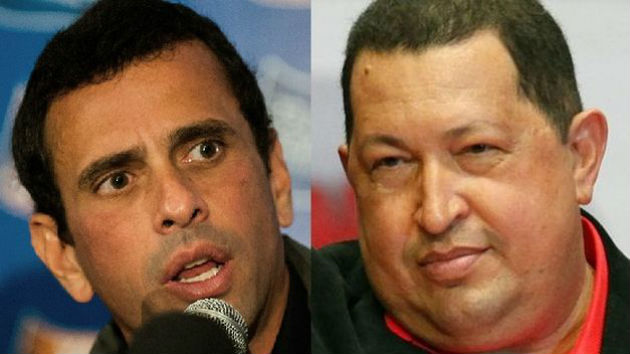UPDATES
Hugo Chávez’s antisemitic re-election strategy
June 15, 2012 | Andrea Nadel

Venezuelan President Hugo Chávez’s hatred of Israel is no secret. His despotic regime’s alliances with countries hostile to Israel, most prominently Iran, are also no secret. Less well known has been the devastating toll that his regime’s overt embrace of antisemitic rhetoric and policies has had on the Venezuelan Jewish community – though AIJAC’s Allon Lee blogged on this in February. Now, as the ailing strongman takes on Henrique Capriles in Venezuela’s presidential election campaign, he is again resorting to antisemitism as a tactic.
Chávez’s primary response to the first real challenge to his leadership in his 13 years of rule is to resort to his old tricks by attacking Capriles’ Jewish ancestry, regardless of the fact that Capriles himself is a devout Catholic. Ben Cohen, writing for Tablet Magazine, reports that:
“[…] Chávez can marshal his extraordinary media and propaganda resources to pound away at Capriles’ reputation. Central to that effort is the demonization of Capriles as an agent of capitalism, gringoism, imperialism, and-critically-a concoction of conspiratorial tropes that point to the greatest lurking danger of all: ‘Zionism,’ which for many is interchangeable with ‘Judaism.'”
Chávez has indeed taken advantage of his media resources. (It doesn’t hurt that his government owns 70% of Venezuela’s media outlets.) Venezuelan National Radio (NVR) recently published a column by Adal Hernandez titled “The Enemy is Zionism: A Ravine as Promise,” which accuses Cabriles of being aided by “International Zionism” and therefore dangerous to Venezuelans. According to Reuters,
“After accusing him of ‘fascist’ and CIA links, the journalist concludes: ‘In October, there are two clear proposals for Venezuela: the Bolivarian Revolution defending the unity of Latin American and interests of the people, or international Zionism, threatening the destruction of our planet.'”
Only exacerbating matters, NVR radio host Cristina Gonzalez subsequently strongly encouraged listeners to read the antisemitic forgery “The Protocols of the Elders of Zion.” The US-based Simon Wiesenthal Center and Anti-Defamation League have both strongly condemned Chávez’s antisemitic pandering, but it doesn’t look like he sees any reason to change his tune.
For starters, although Chávez’s re-election chances remain strong – thanks in large part to his cult following among supporters – his ailing health and domestic challenges have cast doubt on the certainty of a fourth term as president. Capriles’ meteoric rise through Venezuelan politics and his emergence as a popular and formidable opponent are also worrisome for Chávez. As Ben Cohen writes in Tablet,
“[…] Chávez, who is currently serving his third term as president, has never looked so vulnerable. His failing health is only part of the story; in the six years that have passed since the last election, the country has become mired in poverty, violent crime, and corruption. Fired by the high price of oil, Venezuela’s principle export, Chávez lavished cash on social spending, while the underlying economy suffered from inflation and capital flight. These days, Venezuela looks less like a socialist version of Singapore and more like the Latin American equivalent of Zimbabwe. According to Sammy Eppel, the head of the Human Rights Commission of the Venezuelan Bna’i Brith and a frequent commentator on Venezuelan affairs, not even the 8 million beneficiaries of Chávez’s grandiose social justice programs, who combined make up nearly half of the electorate, can be relied upon to cast their votes for the commandante. Capriles, a moderate leftist who leads a coalition of 30 opposition parties, plans to capitalize on this uncertainty.”
Although Capriles has not been afraid to expose Chávez’s tactics for what they really are, Venezuela’s dwindling Jewish community is feeling the impact of Chávez’s policies. The Jewish community has been told that it must address its concerns about antisemitism to Venezuela’s Foreign Ministry and not its interior ministry – creating the impression that Jews are viewed as alien despite the fact that their community has been in Venezuela since the 19th century. What’s more, Tablet reports that
“Just before Passover this year, the interior ministry announced that extra sanitary permits would be needed if the importation of matzo, the unleavened bread consumed during the festival, was to be approved.”
These policies are clearly beginning to take their toll. As attacks on community centers and state-sponsored antisemitism have intensified, Matthew Fishbane of Tablet (link above) has reported that
“As the reality of Chávez’s durability has set in, nearly half of Venezuela’s Jewish community has fled from the social and economic chaos that the president has unleashed and from the uncomfortable feeling that they were being specifically targeted by the regime.”
Chávez’s embrace of antisemitism makes him, regrettably, another link in a long chain of leaders, most notably in the former Eastern Bloc and throughout the Middle East, who have used conspiracy theories about Jewish power and anti-Jewish rhetoric to distract their populations from the real problems their people face. As the Venezuelan election approaches and the campaign intensifies, many fear that Chávez will further intensify his antisemitic rhetoric.
If Chávez and his antisemitic campaign of distraction are declared the winners, all the people of Venezuela will lose but Venezuela’s remaining Jewish community will lose the most.
Andrea Nadel
Tags: Anti-Zionism





